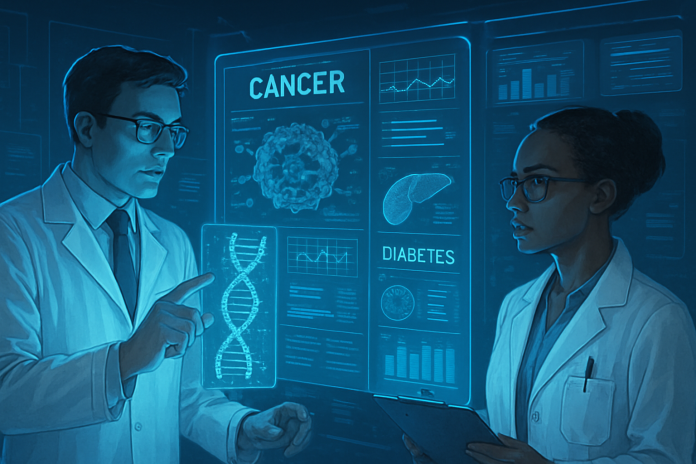Quick Take
- AI reduces cancer drug discovery from years to months using machine learning
- Global cancer cases projected to surge from 20 million to 35 million by 2050
- Type 1 diabetes prevalence climbing from 8.4 million to 9.5 million by 2025
- India launches CATCH Grant program to fund 10 AI healthcare initiatives
- AstraZeneca partners with Immunai for AI-powered oncology trials
Artificial intelligence is transforming how doctors fight cancer and diabetes as healthcare systems prepare for a massive wave of new cases in the coming decades. Cancer diagnoses are expected to hit 35 million annually by 2050 — a dramatic 74% jump from today’s 20 million cases — making AI-powered medical tools crucial for handling this growing health crisis, according to eHealth Magazine.
The problem goes beyond cancer alone. Type 1 diabetes cases keep rising steadily, with global numbers expected to climb from 8.4 million in 2021 to 9.5 million by 2025. Both diseases involve complicated immune system problems, creating perfect opportunities for AI-driven treatment breakthroughs.
Machine Learning Speeds Up Drug Development
Traditional drug research that used to take years in the lab is now being compressed into months through AI’s ability to spot patterns. The technology excels at analyzing massive genetic and immune response databases to find promising drug targets with remarkable precision.
AstraZeneca’s partnership with Immunai shows this shift in action, using machine learning algorithms to speed up cancer trials and create personalized cancer treatments. The collaboration focuses on finding key tumor markers and breaking through immune resistance — stubborn barriers that have long limited cancer treatment success.
Similar progress is happening in diabetes care, where machine learning systems improve treatment plans and boost patient outcomes through advanced data analysis.
India Emerges as AI Healthcare Leader
India is becoming a global powerhouse in AI-powered healthcare innovation through smart government programs. The IndiaAI CATCH Grant program represents a major push to bring artificial intelligence into healthcare delivery, with special focus on better cancer screening and diagnosis.
The program works through partnerships between IndiaAI and the National Cancer Grid, offering significant funding and technical support for game-changing healthcare projects. Up to 10 groundbreaking initiatives can receive backing, putting AI-driven solutions at the heart of India’s healthcare upgrade strategy.
These joint efforts show how national governments see AI’s power to tackle growing healthcare challenges while building homegrown tech expertise, according to eHealth Magazine.
Personalized Medicine Revolution Takes Off
The combination of AI technology with cancer and diabetes research is creating unprecedented personalized treatment options. Machine learning models can now study individual patient genetic profiles, immune responses, and disease patterns to suggest customized treatment plans.
This precision medicine revolution solves a basic problem in traditional healthcare, where one-size-fits-all treatments often produced mixed results across different patient groups.
Growing Global Health Crisis Spurs Innovation
With cancer deaths currently hitting 9.7 million annually and both diseases hitting aging populations especially hard, the push for AI healthcare innovation keeps getting stronger. Lifestyle changes and demographic shifts are speeding up disease rates, making tech solutions increasingly vital for sustainable healthcare.
The strategic partnerships between pharmaceutical giants like AstraZeneca and AI specialists, combined with government programs like India’s CATCH initiative, show a coordinated global response to these mounting healthcare challenges.
Artificial intelligence represents the cutting edge of medical innovation, delivering analytical power and treatment insights that were impossible just decades ago. The matching of scientific progress with patient-focused care goals positions AI as a transformative force capable of tackling humanity’s biggest healthcare challenges while strengthening medical systems worldwide.




